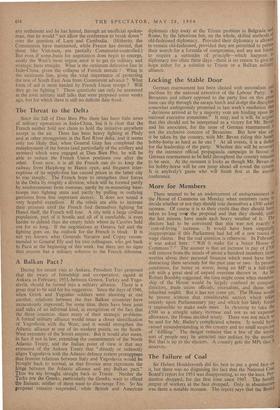During his recent visit to Ankara, President Tito proposed 4
that the treaty of friendship and co-operation, signed at Ankara in February, 1953, between Greece, Turkey and Yugo- slavia, should be turned into a military alliance. There is a great deal to be said for his suggestion. Since the days of 1946, when Greek and Yugoslav soldiers were shooting at one • another, relations between the free Balkan countries. have miraculously improved; for some time, there have been joint staff talks of an informal kind, in recognition of the fact that , the three countries share many of their strategic problems. ' -:.A formal military alliance would mean a closer identification .:t5f Yugoslavia with the West; and it would strengthen the — ' Atlantic alliance at one of its weakest points, on the South- West extremity of the Soviet empire. But it would also mean, in fact if not in law, extending the commitments of the North 111 , Atlantic Treaty, and the Italian point of view is that any extension of the Ankara Treaty that "directly or indirectly aligns Yugoslavia with the Atlantic defence system presupposes . that frontier relations between Italy and Yugoslavia would be lirought back to normal, as that frontier area represents the Inge between the Atlantic alliance and any Balkan pact." us we are brought straight back to Trieste. Neither the Turks nor the Greeks, particularly the Greeks, want to offend diplomats chip away at the Trieste problem in Belgrade and, Rome, by the laborious but, on the whole, skilled methods t) old-fashioned diplomacy. Provided their diplomacy is allowed to remain old-fashioned, provided they are permitted to pursue their search for a formula of compromise, and are not forced to require a surrender of principle—which happens t° diplomacy too often these days—there is no reason to give 111), hope either for a solution to Trieste or a Balkan militar) alliance.


































































 Previous page
Previous page